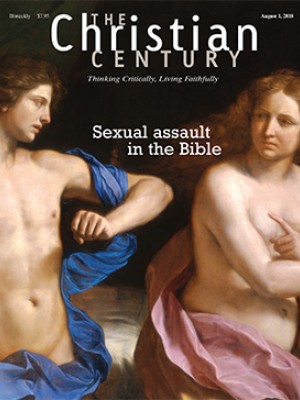August 26, Ordinary 21B (Ephesians 6:10-20; John 6:56-69)
Before judging individuals for their sin, we should try to understand the forces of evil influencing them.
The spiritual forces of evil are a reality in our world. Many atrocities attest to this truth, from slavery and genocide to mass incarceration and the separation of families. As part of our journey of faith, many of us seek an answer to a very old theological question: Where does evil come from? Some theologians have concluded that evil was created by humans’ free will: through the first humans’ willful disobedience of God’s sole commandment, sin entered into the world. Consequently, sin has power over the individual as long as the individual, through the gift of free will, chooses to do evil over good.
This is why, in most Christian traditions, when people commit sin they are treated as autonomous individuals fully conscious and responsible for their own thoughts, motivations, and actions—people who have willfully decided to disobey God. It is left to individuals to try to exert their free will and resist the devil’s temptations. Often the individual is accused of having weak faith, of not being strong enough to resist the power of sin.
Read our latest issue or browse back issues.
However, as New Testament scholar Susan Grove Eastman points out in Paul and the Person, “the self is never on its own but always socially and cosmically constructed in relationship to external realities that operate internally as well.” Consequently, sin is not “a decision made by self-determining individuals, but rather a socially mediated power greater than human beings yet operative through human thoughts, words, and deeds.”
Therefore, as this week’s reading from Ephesians says, “our struggle is not against enemies of blood and flesh, but against the rulers, against the authorities, against the cosmic powers of this present darkness, against the spiritual forces of evil in the heavenly places.” So before judging individuals for their sinful behavior, we should try to understand the “spiritual forces of evil” that might be influencing them. In Genesis 3, Adam and Eve do not make the decision to eat the prohibited fruit by themselves—the serpent influences Eve, and Eve then influences Adam. Evil exists even before they eat the fruit—and human beings are vulnerable to the influence of others.
Rodolfo is a young man from Tenancingo, a small town in Mexico known as a breeding ground for sex traffickers. In the documentary Pimp City, he gives an interview from prison, where he is serving a sentence for sex trafficking. Rodolfo became a pimp when he was 15 years old. The interviewer asks him, “When is the first time you heard that a man can make money by selling the body of a woman?”
“It is a family business,” Rodolfo answers. “Since the boys are ten or 11 years old, they say that they want to be like their fathers, pimps. . . . So, practically, you will end up doing what you know in Tenancingo. That’s what you would do, only what you know.”
According to the film, in Tenancingo the whole family is involved in the sex-trafficking business: grandma, grandpa, mom, dad, everyone. In this town, it is very common to see men prostitute their wives, daughters, sisters, nieces, and any other woman they can seduce and control. Kids see from a very young age that women are merchandise men can buy and sell as they will. As Rodolfo says, they do what they know.
People learn sinful behaviors from somebody or something. Once someone has been affected by this evil force, they can pass it on to other people, consciously or unconsciously. In Rodolfo’s case, his will was influenced by the evil he witnessed and experienced in his own home and town. How can we say that Rodolfo, by his free will, chose to be a pimp if his actions were influenced by the actions of his father, family members, and friends? Under such an influence, nobody's will is actually free.
The good news for Christians is that the One who has given his flesh and blood for our salvation, the bread that came down from heaven (John 6:56), has an even more powerful influence over us. We have been influenced by sinful behavior, which has been passed from generation to generation. However, we have also been influenced by the love and obedience of the Son of God. And just as we participate in Adam and Eve’s sin, through the gift of grace we can also participate in God, in Christ.
But there are many people who, like Rodolfo, have experienced and witnessed only evil and suffering. So those who are in Christ, those who have eaten Jesus’ flesh and drunk his blood, have the responsibility to share this heavenly bread with them, so that they too can “abide in Christ, and Christ in them,” finding refuge from the forces of evil that seek to separate us from the source of love and goodness. Just as sin has propagated among humanity through human beings, so the abundance of grace has propagated among humanity through Christ—and through those who are willing to share it with others.





